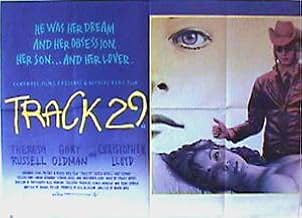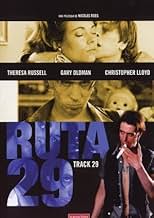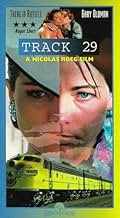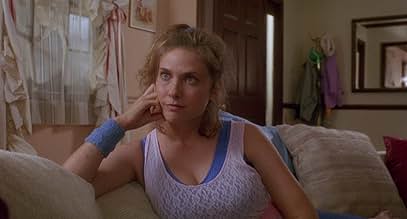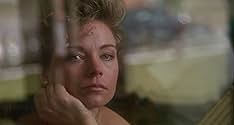IMDb RATING
5.8/10
2.7K
YOUR RATING
Linda is still tormented by giving up a baby for adoption at 15. She wants a baby, but her husband has enough in his model trains, mistress and being a doctor.Linda is still tormented by giving up a baby for adoption at 15. She wants a baby, but her husband has enough in his model trains, mistress and being a doctor.Linda is still tormented by giving up a baby for adoption at 15. She wants a baby, but her husband has enough in his model trains, mistress and being a doctor.
- Awards
- 1 win & 2 nominations total
Vance Colvig Jr.
- Mr. Ennis
- (as Vance Colvig)
Elijah Perry
- Redneck
- (as Jerry Rushing)
Toni De Rose
- Young Linda's friend
- (uncredited)
- Director
- Writer
- All cast & crew
- Production, box office & more at IMDbPro
Featured reviews
Poor Theresa Russell is once again subjected to her husband Nicholas Roeg's own unique brand of cinematic shock therapy, playing a frustrated southern belle trapped in a loveless marriage to model train fanatic Christopher Lloyd (hence the oblique title). When a disturbed young stranger wanders into town claiming to be her long-lost son, she begins to wonder if her mind has snapped, but there's much less to the film than what meets the eye. Roeg likes to mask the meaning of his scenarios behind a smokescreen of self-indulgent style, inside of which is a more-or-less conventional story struggling to get out. His collaboration here with writer Dennis Potter would seem to be a match made in heaven, but stripped of its visual and narrative razzle-dazzle devices the film emerges as little more than a perverse and uneasy mix of satire and psychodrama, with several flamboyant performances and a great mental breakdown montage, showing trains colliding and buildings collapsing, all inside Theresa Russell's pretty, mixed-up head.
The plot is wacky enough to promise a great film: a repressed alcoholic middle-class housewife with incestuous tendencies, married to a doctor with infantilism tendencies, encounters a young English guy who turns out to be her lost son (fruit of a teenage rape, whom she had to give for adoption). But it's not clear what's real & what's not. Freud would be proud.
The bad thing is seeing how generic Hollywood-ian Nicolas Roeg's direction has become. There really is very little here that reminds of "Don't Look Now" or "Bad Timing". Not that it's not worth watching. The spanking sequence is hilariously disturbing, the film has the feel of a hysterically surreal 80's soap opera, and the interplay between past, present, reality & fantasy is sometimes inspired.
In fact David Lynch ended up copying lots of stuff from here, particularly on "Twin Peaks" and "Lost Highway". Notice for example the demonic rape scene, or the merging of the truck driver and lost son characters.
The bad thing is seeing how generic Hollywood-ian Nicolas Roeg's direction has become. There really is very little here that reminds of "Don't Look Now" or "Bad Timing". Not that it's not worth watching. The spanking sequence is hilariously disturbing, the film has the feel of a hysterically surreal 80's soap opera, and the interplay between past, present, reality & fantasy is sometimes inspired.
In fact David Lynch ended up copying lots of stuff from here, particularly on "Twin Peaks" and "Lost Highway". Notice for example the demonic rape scene, or the merging of the truck driver and lost son characters.
Nicholas Roeg's "Track 29", while confusing and frustrating, appears to accomplish what the director and writer set out to do. The film introduces and examines many aspects of Linda's life that are never very clearly answered. If Martin is a figment of her imagination, what is truly imagined? He does appear at the hamburger stand, so is he real after all? Early in the film, a television program is overheard discussing the idea that "two things may ocupy the same time and space". If this is indeed true, than maybe one thing can ocupy more than one time and space. It appears that Linda and Martin may in fact be "exploring" alternate dimensions. The film seems to explore the occurrence and outcome of many different events, and ends with the viewer unclear about what truly happened and what did not. After undergoing real or imaginary emotional torture, Linda calmly collects herself and leaves the house a new woman. To further confuse the lines between imaginary/real, her husband is heard calling to her, even though a pool of blood is forming over her head. (presumably from the stabbing death of the same husband) It is through these very strange events and ideas that the director and writer force the viewer to attempt to decide what is real and what is imagined. The most frustrating thing of all is that there is no real answer to this question.
In a small southern American town, housewife Linda Henry lives a unsatisfied life and wants a child to fulfil that gap, but her husband Henry seems more concerned about his model trains and receiving his fetish spanking from nurse Stein. One day in a diner, an odd and mysterious young English lad Martin approaches Linda and her friend. He seems to appear where she is, so when another confrontation eventuates. He admits to being her son, which he was taken from her at birth when she was a teenager, due to the reasoning of his conception. This newfound responsibility is bittersweet for Linda, but has it come at a price for her well-being.
Bizarre, extremely bizarre and sultry! Nicholas Roeg's "Track 29" is really hard to fathom, which can make it quite frustrating, due to the fact the pieces of this hysterically traumatic psychological puzzle never come to be one. Maybe that was on purpose, as the dysfunctional characters (usually lurking in small town settings) we follow seem rather disconnected, never quite sure of themselves and longing for something which could lead to an emotional breakdown. This exploration into the protagonists' wavering consciousness brings out many facets, like revelations of the past and those things that matter most for them to feel anything. The obsessive nature takes hold, where torment and frustration develops with neurotic results, which could finally lose out to fantasy, because reality and their situation is just to hard to come to grips with. Because of that, Dennis Potter's unbalanced, warped screenplay really does put you on the spot and throws around plenty of eye-boggling surreal passages. Symbolic clues feature thickly throughout and the themes that drown the moody, but complex script leave a strong imprint. While I don't think it's all-successful in conveying its ideas, it's still very interesting to watch.
Building it up is the unusual kinky charge, perversely pitch-black humour and a terror-away performance by the nutty Gary Oldman. Boy, Oldman annoys with his infantile portrayal, but that peculiar intensity he generates and his edgy rapport with co-star Theresa Russell has you hypnotised. The two have some curious exchanges. Russell projects a fully realised performance, that bubbles, but you also feel her growing pain and uncertainty of her fragile character. Too bad about the southern accent though. Christopher Lloyd goes offbeat too, but more so in an understated and controlled turn. Sandra Bernhard's Nurse Stein makes an impression. Roeg's leisurely paced direction might not be as beautifully visceral, but winning out is a very gleeful and excessive approach that's high quality. Like Oldman's character, Roeg lets it play out like a kooky tantrum with a lingering mean-streak. The leering camera-work seems to hover on its shots awkwardly, or give it a smothering feeling, and the simmering music score is been kept under-wraps.
Another original and provocative piece of work into the realm of surrealistic ambiguity combined with expressive allegories and a sensually twisted flavour. This one really challenges the viewer (like most of Roeg's work), then highly entertains.
Bizarre, extremely bizarre and sultry! Nicholas Roeg's "Track 29" is really hard to fathom, which can make it quite frustrating, due to the fact the pieces of this hysterically traumatic psychological puzzle never come to be one. Maybe that was on purpose, as the dysfunctional characters (usually lurking in small town settings) we follow seem rather disconnected, never quite sure of themselves and longing for something which could lead to an emotional breakdown. This exploration into the protagonists' wavering consciousness brings out many facets, like revelations of the past and those things that matter most for them to feel anything. The obsessive nature takes hold, where torment and frustration develops with neurotic results, which could finally lose out to fantasy, because reality and their situation is just to hard to come to grips with. Because of that, Dennis Potter's unbalanced, warped screenplay really does put you on the spot and throws around plenty of eye-boggling surreal passages. Symbolic clues feature thickly throughout and the themes that drown the moody, but complex script leave a strong imprint. While I don't think it's all-successful in conveying its ideas, it's still very interesting to watch.
Building it up is the unusual kinky charge, perversely pitch-black humour and a terror-away performance by the nutty Gary Oldman. Boy, Oldman annoys with his infantile portrayal, but that peculiar intensity he generates and his edgy rapport with co-star Theresa Russell has you hypnotised. The two have some curious exchanges. Russell projects a fully realised performance, that bubbles, but you also feel her growing pain and uncertainty of her fragile character. Too bad about the southern accent though. Christopher Lloyd goes offbeat too, but more so in an understated and controlled turn. Sandra Bernhard's Nurse Stein makes an impression. Roeg's leisurely paced direction might not be as beautifully visceral, but winning out is a very gleeful and excessive approach that's high quality. Like Oldman's character, Roeg lets it play out like a kooky tantrum with a lingering mean-streak. The leering camera-work seems to hover on its shots awkwardly, or give it a smothering feeling, and the simmering music score is been kept under-wraps.
Another original and provocative piece of work into the realm of surrealistic ambiguity combined with expressive allegories and a sensually twisted flavour. This one really challenges the viewer (like most of Roeg's work), then highly entertains.
A doctor's wife (Theresa Russell) tires of his obsession with model trains, and spends her days wondering about the son she gave up for adoption at birth...
How can you not love a film with Christopher Lloyd as a masochist doctor who drops his pants? And Gary Oldman as a weird, British man-child? And directed by the wonderfully under-appreciated Nicholas Roeg ("Don't Look Now")? Well, with this film, it is possible.
Janet Maslin has more than a few problems with it, as she says "the direction is so laden with contempt for the characters... Roeg's films can often be perverse... (but) they are rarely this silly." The film is "too mindless to have any impact" and she believes the actors' skills are "regrettably wasted". I will agree with that last point -- for as much as I love Oldman and Lloyd, I felt they were too confined by this film to really show off.
Roger Ebert gave the film three stars, despite saying he did not like it. He posits the idea that the film is "perhaps deliberately" unlikeable. Yet, the film is still a good one and "more interesting" because of it. Roeg's work is "strange" and "convoluted", as well as "bad-tempered, kinky and misogynistic."
While I am unsure of all that, I do agree with the overall point Ebert makes. I, like him, did not enjoy the movie. Yet, I see the psychological message it was trying to send, the odd symbolism and the cacophony of images. The direction is, in fact, top-notch. Oldman is frustratingly annoying, but that is who his character is. I think the goal was met, despite being a goal I had rather they were not striving for.
How can you not love a film with Christopher Lloyd as a masochist doctor who drops his pants? And Gary Oldman as a weird, British man-child? And directed by the wonderfully under-appreciated Nicholas Roeg ("Don't Look Now")? Well, with this film, it is possible.
Janet Maslin has more than a few problems with it, as she says "the direction is so laden with contempt for the characters... Roeg's films can often be perverse... (but) they are rarely this silly." The film is "too mindless to have any impact" and she believes the actors' skills are "regrettably wasted". I will agree with that last point -- for as much as I love Oldman and Lloyd, I felt they were too confined by this film to really show off.
Roger Ebert gave the film three stars, despite saying he did not like it. He posits the idea that the film is "perhaps deliberately" unlikeable. Yet, the film is still a good one and "more interesting" because of it. Roeg's work is "strange" and "convoluted", as well as "bad-tempered, kinky and misogynistic."
While I am unsure of all that, I do agree with the overall point Ebert makes. I, like him, did not enjoy the movie. Yet, I see the psychological message it was trying to send, the odd symbolism and the cacophony of images. The direction is, in fact, top-notch. Oldman is frustratingly annoying, but that is who his character is. I think the goal was met, despite being a goal I had rather they were not striving for.
Did you know
- TriviaThe young Linda is seen with posters of George Harrison (executive producer of this movie) and David Bowie (star of director Nicolas Roeg's hit L'homme qui venait d'ailleurs (1976)) on her bedroom wall.
- GoofsAfter being confronted by Martin (Gary Oldman) during her attempted (pseudo)-suicide by drowning herself in the pool, Linda Henry (Theresa Russell) exits the pool for the very first and only-ever time and there is plainly seen a trail of dripping water leading from where she is exiting the pool over to where she is retrieving her towel, clearly left over from a previous take of the same sequence just moments before.
- Quotes
Henry Henry: If there's one thing I've learned in this world, it's that women and trains don't mix!
- SoundtracksM.O.T.H.E.R.
By Theodore Morse and Fiske O'Hara
© 1915 Leo Feist Inc.
Used by Permission of Ascherberg, Hopwood & Crew Ltd.
Lyrics by Howard Johnson (uncredited)
Performed by Gary Oldman (uncredited)
- How long is Track 29?Powered by Alexa
Details
- Release date
- Countries of origin
- Official site
- Language
- Also known as
- Track 29 - Ein gefährliches Spiel
- Filming locations
- Production company
- See more company credits at IMDbPro
Box office
- Budget
- $5,000,000 (estimated)
- Gross US & Canada
- $429,028
- Opening weekend US & Canada
- $19,304
- Sep 11, 1988
- Gross worldwide
- $429,028
- Runtime1 hour 31 minutes
- Color
- Sound mix
- Aspect ratio
- 1.85 : 1
Contribute to this page
Suggest an edit or add missing content



